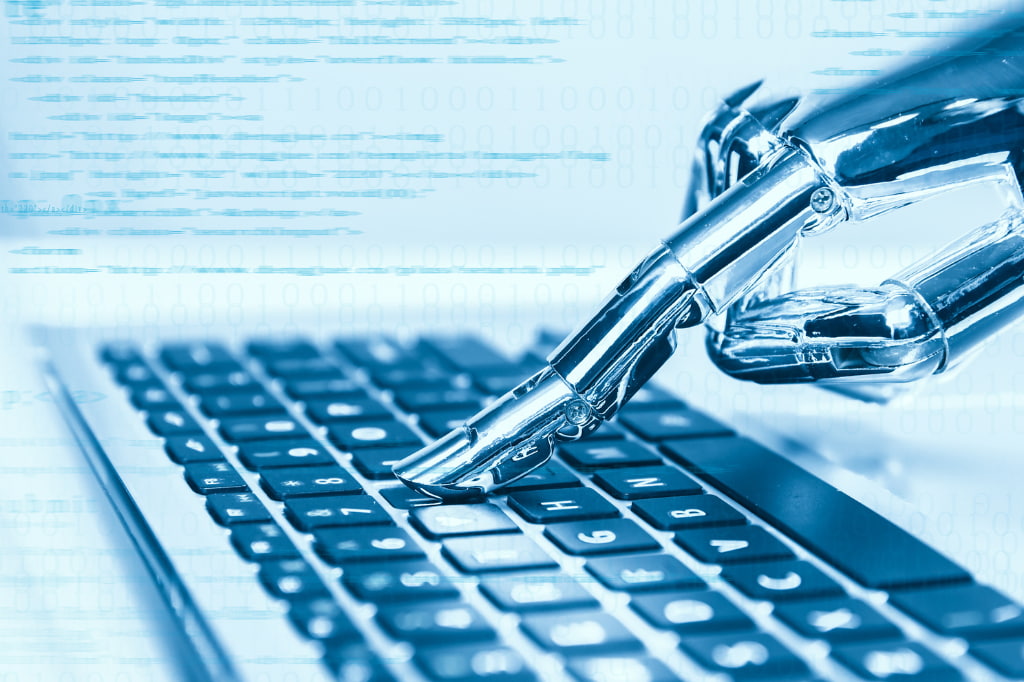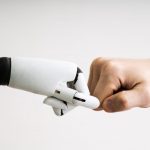Not so long ago, artificial intelligence, also known as AI, was a science fiction concept. Today AI is a reality that is shaping the future of HR and transforming companies and industries around the world. The use of AI in human resources is, now more than ever, a common practice to optimize HR processes.
The use of AI in HR is reshaping the way companies manage their workforce, from recruitment and onboarding to employee engagement and performance reviews, as there are many HR tools powered by AI. The future of HR rests on AI as it continues to evolve and offer great opportunities to optimize processes, improve decision making, facilitate data analytics and create better employee experiences.
What is AI in HR?
When artificial intelligence arrived at companies, I’m sure you thought, “Can I apply AI to our processes as well as other companies do? What does the future of HR look like?”. To answer these questions, let’s think of artificial intelligence in Human Resources as the integration of AI technologies into HR tasks to enhance a variety of processes. Does it sound like you can apply AI to HR? Of course, yes!
AI technologies may encompass machine learning, natural language processing, predictive analytics, automation tools, and many more. By leveraging AI, HR professionals can reduce manual tasks, improve decision-making, provide more personalized employee experiences, and promote employee participation in HR initiatives.
AI in HR covers a wide range of applications: recruiting, onboarding, performance reviews, employee engagement, people analytics, feedback management, etc. Wouldn’t it be great if AI could help you predict turnover? Well, it can!
Benefits of AI in HR
Using AI is called to be the future of HR, but it’s establishing itself as the present of HR. It is already revolutionizing how organizations manage their workforce. There are already multiple AI trends in HR in use. By leveraging AI technologies, HR departments can reap multiple benefits:
AI increases efficiency for HR teams
One of the most remarkable benefits of using AI in human resources is the automation of routine tasks. With AI, HR professionals can delegate time-consuming activities such as scheduling interviews, processing leave requests and answering frequently asked questions. This automation frees up time to focus on more strategic initiatives, such as talent development and employee engagement.
Examples: how can AI increase efficiency for HR teams?
- Recruitment and hiring is one of the most time-consuming processes within an HR team. AI can significantly optimize the recruitment process by automating tasks such as screening resumes, candidate sourcing, reference checks, personality assessments, job description writing, scheduling interviews and transcription and resume of interviews with candidates.
- For managing internal communication, instead of manually responding to each employee question, HR can set up a virtual assistant to handle these queries. This will also ensure quick and accurate responses while HR professionals work on higher-priority tasks.
- Personalizing the onboarding process by providing new hires with welcoming information and resources for their initial days. It can also be beneficial for current employees who transition to different positions or departments. AI-driven onboarding systems can guide these employees through the required training for their new roles, ensuring a smooth transition.
- AI can automate many repetitive administrative tasks, such as processing payroll, scheduling interviews, managing employee holidays, and so on. This automation reduces the time HR professionals spend on these tasks, allowing them to focus on more strategic initiatives.
AI ensures consistency in communication
Using AI in human resources guarantees uniform communication and responses throughout the company. By employing a standardized AI model to manage routine HR interactions, companies can minimize the likelihood of errors or miscommunications that can occur due to human inconsistencies. This reliability is essential for upholding clear and dependable communication with employees.
Example: how can AI ensure consistency in communication?
- When employees inquire about company policies, AI can provide uniform answers, ensuring that all employees receive the same information and reducing the potential for miscommunication.
AI promotes accessibility and collaboration
AI offers continuos support to employees around the clock, enhancing accessibility and collaboration. With this 24/7 availability, employees can get immediate help no matter the time or where they are.
Example: how can AI promote accessibility?
- An employee working remotely in a different time zone can use the virtual assistant to get answers to their questions without waiting for the HR department to be available. This ensures continuous support and improves the overall employee experience.
- Under the same situation, AI-driven tools enhance collaboration by offering real-time communication and project management solutions. These tools enable teams to work more efficiently and stay connected, regardless of their location.
AI facilitates data-driven insights
AI provides data-driven insights that support informed decision-making. AI tools can help identify trends and potential issues within your people’s data before they escalate. By examining patterns and trends that may not be visible to human analysts, HR professionals can make informed decisions to improve the employee experience.
Example: how can AI facilitate data-driven insights?
If the virtual assistant notices a high volume of questions about a particular policy, it can send an alert to HR. HR can review and clarify that policy to address any confusion, ensuring better understanding and compliance among employees.
AI promotes personalization
AI-powered tools can help personalize the employee experience by providing tailored recommendations and support. Whether it’s suggesting relevant training programs, career development opportunities, or wellness resources, artificial intelligence can enhance employee satisfaction and engagement by catering to individual needs.
Example: how can AI promote personalization?
- Creating individualized and personalized learning experiences. HR professionals can use AI to analyze employees’ profiles; their skills, knowledge gaps, career goals, and learning preferences. With this information, you can recommend tailored training courses and resources. This ensures that training is relevant and effective, helping employees develop the skills needed for their current roles or future career advancement.
- With AI-powered courses. To close the circle, there are also AI-driven training platforms that offer AI-powered courses that help employees learn or reinforce their skills by practicing with the help of artificial intelligence.
The future of HR is already here and it’s called “artificial intelligence”. Think of artificial intelligence as a transformative tool that can bring you substantial benefits. From improving recruitment and onboarding to enhancing employee engagement and the exploitation of people’s data. By using AI in human resources, HR professionals can unlock new levels of productivity and effectiveness, contributing to a more engaged workforce.
Will AI replace human resources?

AI has become the future of HR and is transforming the way human resources professionals operate, but it is unlikely to completely replace humans. Instead, AI will enhance the capabilities of HR professionals, allowing them to focus on more strategic and value-added activities. We do not expect AI to replace human resources entirely. Here are some reasons why:
- Human touch: human resources is mainly about people, and the human touch is essential in areas such as employee engagement, company culture and conflict resolution. AI cannot replicate the emotional intelligence and empathy required for these tasks.
- Complex decision making: while AI can provide data-driven insights, and even delve in data deeper than human analysts, complex decision-making often requires human judgment. For complex decision making it is necessary to have wide experience. HR professionals bring context, intuition, and a deep understanding of organizational dynamics that AI cannot match.
- Ethical considerations: ensuring ethical practices require human oversight. HR professionals play a critical role in developing and implementing fair and transparent communication and policies.
- Strategic Leadership: AI can handle routine tasks, but strategic leadership is a human quality. HR professionals are essential for developing long-term strategies that drive organizational change and foster a positive company culture.
Artificial intelligence is shaping the future of HR as it remains a powerful tool that will continue to transform and help HR in many ways. However, humans remain crucial in HR, ensuring that technology is used ethically and strategically to create a positive workplace.










